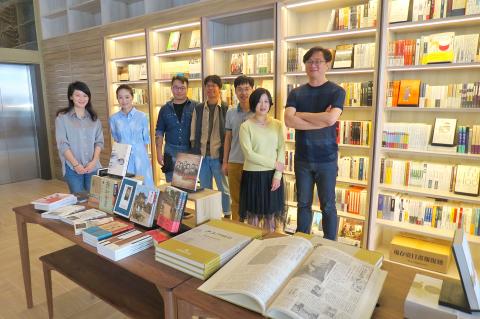One of Taiwan’s oldest and largest bookstores is to reopen under new ownership next month in Taichung, after being closed for 21 years.
Located on the corner of Taiwan Boulevard and Shifu Road in Taichung’s Central District (中區), Central Bookstore opened on Jan. 3, 1927, during the Japanese colonial period. The store was opened by the Taiwanese Cultural Association, which used the venue to host meetings of pro-democracy activists and to help develop a localized culture.
It was closed in 1998, with its owners citing financial difficulties. The space has since been used as a wedding gown shop, a convenience store and a motorcycle helmet shop.

Photo: Su Meng-chuan, Taipei Times
In 2016, the Shang Shan Human Culture Foundation obtained the rights to the building following an architect’s Facebook campaign to save it from demolition. Over the next three years, the foundation had the three-story building renovated in preparation for the bookstore’s reopening.
“The new Central Bookstore won’t be just a bookstore. It will have spaces for reading, exhibitions and talks, dining and other cultural activities. It will carry out the Central Bookstore’s mission of promoting localization and cultural awareness,” the foundation said.
The original Central Bookstore had been a publisher as well as a retail store, ran its own magazine and hosted talks, it said.
For many years, the store was a place where academics and other locals would buy books and meet friends, so it has a special place in the hearts of Taichung people, the foundation said.
The now-renovated building with its gold sign above the entrance has been attracting the attention of passersby, and many expressed anticipation of the bookstore’s reopening, the foundation said.
The first floor of the new store will focus primarily on books about Taiwanese culture and Taichung, will have a space for exhibitions and will also showcase selected local arts items, it said.
The second floor will have a play space for parents and young children, and will house lifestyle books and dining options, the foundation said, adding that the third floor would house literature and history works, as well as a space for public talks.
“Unlike at conventional bookstores, when people walk through the doors they won’t be hemmed in by a sea of books. Maintaining the building’s unique circular architecture, we avoided walling things in,” it said. “We kept the area next to the large French windows as a space for book lovers to sit and read.”
Fan Yun-lung (繁運隆), who is head of business operations at the bookstore, said he wants to preserve the store’s strong reputation and carry on the its mission of promoting local culture.
Store vice chairman Shen Chen-hui (沈貞慧) said that the store would emphasize cultural exchange and would not carry books such as educational texts or other “utilitarian” works.
The store will start trial operations in November and formally open in January, he said.

Chinese Nationalist Party (KMT) Chairman Eric Chu (朱立倫), spokeswoman Yang Chih-yu (楊智伃) and Legislator Hsieh Lung-chieh (謝龍介) would be summoned by police for questioning for leading an illegal assembly on Thursday evening last week, Minister of the Interior Liu Shyh-fang (劉世芳) said today. The three KMT officials led an assembly outside the Taipei City Prosecutors’ Office, a restricted area where public assembly is not allowed, protesting the questioning of several KMT staff and searches of KMT headquarters and offices in a recall petition forgery case. Chu, Yang and Hsieh are all suspected of contravening the Assembly and Parade Act (集會遊行法) by holding

PRAISE: Japanese visitor Takashi Kubota said the Taiwanese temple architecture images showcased in the AI Art Gallery were the most impressive displays he saw Taiwan does not have an official pavilion at the World Expo in Osaka, Japan, because of its diplomatic predicament, but the government-backed Tech World pavilion is drawing interest with its unique recreations of works by Taiwanese artists. The pavilion features an artificial intelligence (AI)-based art gallery showcasing works of famous Taiwanese artists from the Japanese colonial period using innovative technologies. Among its main simulated displays are Eastern gouache paintings by Chen Chin (陳進), Lin Yu-shan (林玉山) and Kuo Hsueh-hu (郭雪湖), who were the three young Taiwanese painters selected for the East Asian Painting exhibition in 1927. Gouache is a water-based

Taiwan would welcome the return of Honduras as a diplomatic ally if its next president decides to make such a move, Minister of Foreign Affairs Lin Chia-lung (林佳龍) said yesterday. “Of course, we would welcome Honduras if they want to restore diplomatic ties with Taiwan after their elections,” Lin said at a meeting of the legislature’s Foreign Affairs and National Defense Committee, when asked to comment on statements made by two of the three Honduran presidential candidates during the presidential campaign in the Central American country. Taiwan is paying close attention to the region as a whole in the wake of a

OFF-TARGET: More than 30,000 participants were expected to take part in the Games next month, but only 6,550 foreign and 19,400 Taiwanese athletes have registered Taipei city councilors yesterday blasted the organizers of next month’s World Masters Games over sudden timetable and venue changes, which they said have caused thousands of participants to back out of the international sporting event, among other organizational issues. They also cited visa delays and political interference by China as reasons many foreign athletes are requesting refunds for the event, to be held from May 17 to 30. Jointly organized by the Taipei and New Taipei City governments, the games have been rocked by numerous controversies since preparations began in 2020. Taipei City Councilor Lin Yen-feng (林延鳳) said yesterday that new measures by